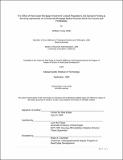| dc.contributor.advisor | Lynn M. Fisher. | en_US |
| dc.contributor.author | Wells, William Casey | en_US |
| dc.contributor.other | Massachusetts Institute of Technology. Center for Real Estate. Program in Real Estate Development. | en_US |
| dc.date.accessioned | 2010-05-25T19:21:18Z | |
| dc.date.available | 2010-05-25T19:21:18Z | |
| dc.date.copyright | 2009 | en_US |
| dc.date.issued | 2009 | en_US |
| dc.identifier.uri | http://hdl.handle.net/1721.1/54866 | |
| dc.description | Thesis (S.M.)--Massachusetts Institute of Technology, Program in Real Estate Development in Conjunction with the Center for Real Estate , 2009. | en_US |
| dc.description | This electronic version was submitted by the student author. The certified thesis is available in the Institute Archives and Special Collections. | en_US |
| dc.description | Cataloged from student submitted PDF version of thesis. | en_US |
| dc.description | Includes bibliographical references (p. 88-89). | en_US |
| dc.description.abstract | This paper examines REMIC regulations and Pooling and Servicing Agreements in an effort to ascertain if either the REMIC regulations or standard Pooling and Servicing Agreements are unnecessarily restrictive in the context of maximizing the profitability and minimizing losses associated with CMBS workouts, with particular attention given to the current real estate climate. The paper begins with a brief history of REMICs and moves on to an examination of the statutory requirements governing the creation and maintenance of REMIC status. Next, an examination of standard Pooling and Servicing Agreements is performed followed by attempts to identify weaknesses in REMIC regulations, which are illustrated by hypothetical examples. Potential modifications to REMIC regulations are divided into two categories: Preemptive Default and Actual Default. The paper concludes that, excepting for the discretionary short term allowance of balloon payment extensions, preemptive default modifications are unwarranted and impractical. However, the author also draws the conclusion that improvements to PSA?s might be met through better integration of master and special servicers in certain scenarios and that REMIC regulations might be improved by allowing for certain material changes to collateral as well as carve outs in default scenarios as well as short run stop gap measures including REO Debt lending and an increase to the allowable length of the REO hold period. | en_US |
| dc.description.statementofresponsibility | by William Casey Wells. | en_US |
| dc.format.extent | 89 p. | en_US |
| dc.language.iso | eng | en_US |
| dc.publisher | Massachusetts Institute of Technology | en_US |
| dc.rights | M.I.T. theses are protected by
copyright. They may be viewed from this source for any purpose, but
reproduction or distribution in any format is prohibited without written
permission. See provided URL for inquiries about permission. | en_US |
| dc.rights.uri | http://dspace.mit.edu/handle/1721.1/7582 | en_US |
| dc.subject | Center for Real Estate. Program in Real Estate Development. | en_US |
| dc.title | The effect of Real Estate Mortgage Investment Conduit regulations and standard pooling & servicing agreements on commercial mortgage backed security work out success and profitability | en_US |
| dc.type | Thesis | en_US |
| dc.description.degree | S.M. | en_US |
| dc.contributor.department | Massachusetts Institute of Technology. Center for Real Estate. Program in Real Estate Development. | en_US |
| dc.contributor.department | Massachusetts Institute of Technology. Center for Real Estate | |
| dc.identifier.oclc | 609851654 | en_US |
